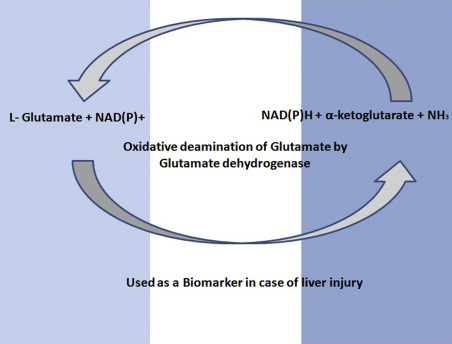Leveraging cutting-edge artificial intelligence technology, CD Biosynsis offers a comprehensive range of services to meet the exacting demands of the scientific community. From the inception of enzyme design to the delivery of meticulously engineered products, our platform offers an end-to-end solution for your diagnostic enzyme needs.
Introduction to Diagnostic Enzymes
Diagnostic enzymes are pivotal biomarkers utilized in the realm of clinical diagnostics. These biochemical catalysts, when detected in blood or other body fluids, can suggest the potential presence of a disease or a specific physiological state. The concentration of particular enzymes in bodily fluids can deviate from their common levels due to tissue damage, cellular death, or disease, thus providing an indicator of pathological processes. Involved in the metabolic activities of the body, these enzymes originate in specific organs, like liver, heart, muscle, or pancreas.
 Fig 1. Glutamate dehydrogenase is used to detect liver injury. (Belorkar S A, et al., 2022)
Fig 1. Glutamate dehydrogenase is used to detect liver injury. (Belorkar S A, et al., 2022)
The quantification and investigation of these enzymes provide valuable insights into disease progression or regression. Accordingly, higher or lower than normal concentrations in body fluids can be illustrative of dysfunctional metabolic activities or reflective of organ malfunctions. Patterns observed in enzyme concentrations may give rise to diagnosing conditions like heart diseases, liver diseases, muscle diseases, cancer, etc. Hence, the importance of diagnostic enzymes extends not only to diagnosis but also to prognostic evaluations, providing direct feedback on the effectiveness of therapeutic interventions.
Types of Our Diagnostic Enzyme
- Immunoassay Enzymes. Enhancing immunoassay sensitivity and specificity.
- Nucleic Acid Amplification Enzymes. Boosting PCR and DNA amplification.
- Protein Detection Enzymes. Enabling precise protein quantification.
- Metabolite Analysis Enzymes. Facilitating metabolic profiling.
- Biosensor Enzymes. Enhancing biosensor functionality.
- Substrate-specific Enzymes. Custom enzymes for specific substrates.
Customized Solutions Offering
- Assay Development. Tailored assays for unique research goals.
- Enzyme Modification. Fine-tuning enzymes for specialized applications.
- Kinetic Analysis. In-depth enzyme kinetic studies.
- Biomarker Discovery. Identifying novel biomarkers for disease research.
- High-Throughput Screening. Automation for large-scale experiments.
Our Technical Advantages

AI-driven Design
Harnessing advanced AI algorithms for enzyme engineering.

Multidisciplinary Expertise
A team of experts in biology, biochemistry, and AI.

Molecular Modeling
Employing computational methods for enzyme optimization.

High-throughput Screening
Automating enzyme characterization.
Whether your research necessitates the development of custom enzymes, specialized assays, or the quest for groundbreaking biomarkers, CD Biosynsis, driven by the power of artificial intelligence, is poised to accelerate your scientific discovery. For inquiries and to embark on a collaborative scientific partnership, please do not hesitate to contact us.
Reference
- Belorkar, S. A.; et al. Chapter 12 - Biotechnological applications of enzymes and future prospective. Protocols and Applications in Enzymology. 2022, 225-238.

































 Fig 1. Glutamate dehydrogenase is used to detect liver injury. (Belorkar S A, et al., 2022)
Fig 1. Glutamate dehydrogenase is used to detect liver injury. (Belorkar S A, et al., 2022) 

